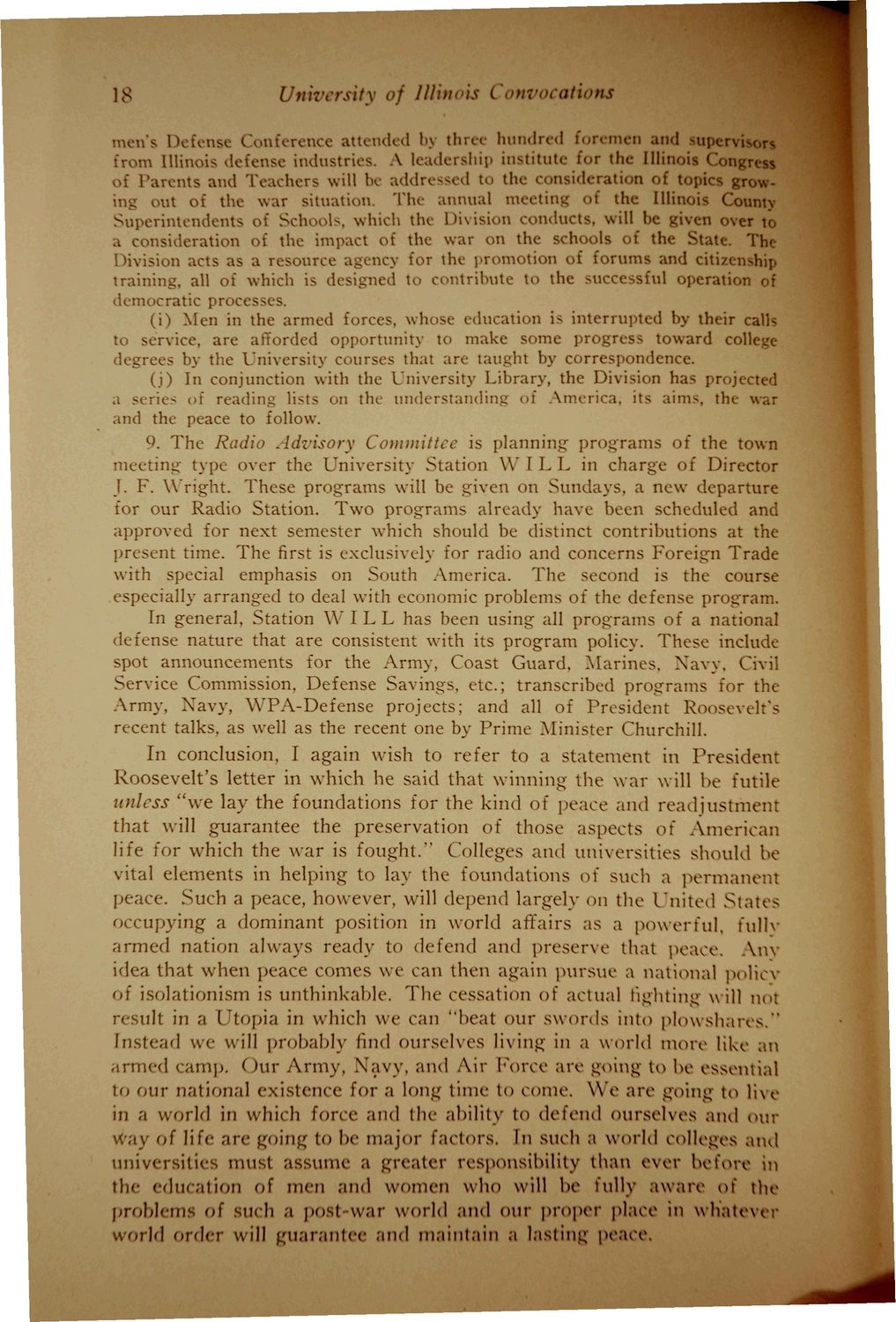| |
| |
Caption: Convocation - 1942 Winter-Spring
This is a reduced-resolution page image for fast online browsing.

EXTRACTED TEXT FROM PAGE:
18 University i Illinois I m\ nations men 1) ensc Confei nc< attended by thn hundred forem ind suj rvi m Illinois defen industri \ 1 lership institute >r the Illinois I of Parent and Teachers will be addn sed to the ideration pics gi ing out of the war situation. The annual m iting of the III: County Sn; rintendents of Sch< Is, which the Division conducts, will 1 giv r t< consideration of the impact of the war on the f th 5tat( Th \)[\ is a r ource a for the promotion i forui id citi2 hip train: all of which is designed to contribute to th( succ< jful oj ition o d mocratic proc s. (i) Men in the armed forc< whose education is interrupted by their call to service, are afforded opportunity to make some progn toward coll c legrees by the University conr s that are taught by corn K>ndence. (j) In conjunction with the University Librar\ die Div on h; jected a series f reading lists on the understanding oi An rica, its aims, the war .nd the peace to follow. °. The Radio Advisory Committee is planning programs of the town neeting type over the University Station W I L L in charge of Director J. F. Wright. These programs will be iven on Sundays, a new departure for our Radio Station. Two progr ns already have been cheduled and approved for next semester which should be distinct contributions at the present time. The first is exclusively tor radio and concerns Fort n Trade with special emphasis on South America. The second is the course especially arranged to deal with economic problems of the defense pn -.ram. In general. Station W I L L has been using all programs of a national lefense nature that are consistent with its program policy. These include spot announcements for the Army, Coast Guard, Marines. Navy, Civil Service Commission, Defense Savings, etc.; transcribed programs for th Army. Navy, WPA-Defense projects; and all of President Roosevelt's recent talks, as well as the recent one by Prime Minister Churchill. In conclusion. I again wish to refer to a statement in President Roosevelt's letter in which he said that winning the w a r will be futile unless " w e lay the foundations for the kind of peace and readjustment that will g u a r a n t e e the preservation of those aspects oi American life for which the w a r is fought." Colleges and universities should be vital elements in helping to lay the foundations of such a p e r m a n e n t peaee. Such a peace, however, will depend largely on the United States occupying a dominant position in world affairs as a powerful, fullv armed nation always ready to defend and preserve that peace. Anv idea that when peace comes we can then again pursue a national polic of isolationism is unthinkable. T h e cessation oi actual fighting will in result in a Utopia in which we can "heat our swords into plowshares." Instead we will probably find ourselves living in a world more like an rmed camp. Our Army, Navy, and Air Force are going to be essential to o u r national existence for a long time to come. W e are going to l i \ c in a world in which force and the ability to defend ourselves and ou vvay of life are going to be major factors. In such a world colleges and universities must assume a greater responsibility than ever before in the education of men and women who will he fully a w a r e oi the problems of such a posl war world and our proper place in whatever world order will guaranty tnd maintain a lasting peace,
| |